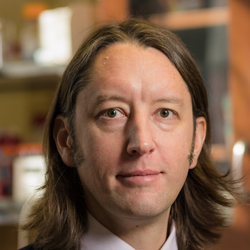National Science Foundation Grant Opens New Doors for Center for Synthetic Biology
The grant will allow the creation of a new graduate-level training program that focuses on PhD students
Northwestern’s Center for Synthetic Biology (CSB) is one of the global hubs for innovation in its field. A prestigious grant promises to push the program even further.
The National Science Foundation awarded $3 million to support a new graduate-level training program that focuses on PhD students. Northwestern Engineering’s Julius Lucks, associate professor of chemical and biological engineering, is the principal investigator.

“We’re creating a real curriculum in synthetic biology,” said Lucks, a CSB member. “The way we’re teaching is completely determined by the nature of the research and the research goals.”
CSB’s research draws from the tools and concepts of biology, physics, engineering, mathematics and computer science to explore four unique themes: cell-free systems, mammalian systems, enabling technologies, and ethics and societal impact. The group aims to tackle big societal challenges, ranging from clean water to vaccine development.
Students enter CSB from different backgrounds and disciplines. With the grant’s support, the program can now provide a common framework to help students fit in their respective expertise.
“Our goal is to bring in the best students from across the country to continue building the center into a global hub,” said Michael Jewett, CSB director and Walter P. Murphy Professor of Chemical and Biological Engineering. “We will train these students to be the next generation of scientific leaders and ensure that they are diverse, interdisciplinary, and forward-thinking.”
Co-principal investigators include Jewett, Neha Kamat, assistant professor of biomedical engineering, and Danielle Tullman-Ercek, associate professor of chemical and biological engineering, along with Susanna Calkins, director of faculty initiatives for Northwestern’s Searle Center for Advancing Learning and Teaching.
The CSB aims to train engineers to think about where they should focus their attention and how to make equitable and socially responsible contributions.
“We’re not just trying to produce technical masters of synthetic biology,” Lucks said. “We want people to go out into the world and responsibly innovate and use synthetic biology for the public good.”